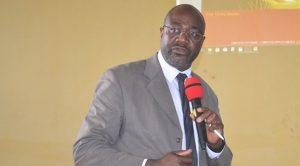The Director, Centre for Climate Change and Development Alex Ekwueme Federal University Ndufu Alike, and the Project Coordinator, Deep Decarbonisation Project (DPP), Prof. Chukwumerije Okereke, has commended the Federal Government of Nigeria for launching the Long-Term Strategy (LTS), project which he said would play a vital role in identifying and costing the measures that would help Nigeria achieve low carbon and climate resilient development.

Prof. Okereke made the assertion while presenting a paper entitled “Nigeria’s Net-Zero target: The linkages and expected synergies of Nigeria’s Long-Term Strategy (LTS), Deep Decarbonisation Pathways for Nigeria (DDP) Energy Transition Plan (ETP) and the Nationally Determined Contributions (NDC)” during the launching of Nigeria’s long-term low emissions development strategy popularly known as the long-term strategy (LTS) in Abuja on Thursday, May 12, 2022.
According to him, “the LTS will play a vital role in identifying and costing the measures that would help Nigeria achieve low emission growth and the net zero carbon emission pledge made by President Buhari at COP26 in Glasgow and long-term low carbon sustainable development”.
It will be recalled that President Buhari, speaking at the World leaders meeting on November 2, 2021, stated that while he recognised that Nigeria is an oil dependent economy, there was also an imperative for Nigeria to join the rest of the world in pushing for rapid emission reduction and transformation necessary to meet the Paris climate change target.
As a result, the president announced that Nigeria would cut its emissions down to net zero by 2060. He said that the emission reductions would be guided by the commitment to sustainable development for Nigeria.
However, it will be recalled that at the time the announcement was made by the President Nigeria did not have a comprehensive long term comprehensive low GHG emission development plan. He said the NDC which was available at the time of the announcement has had a 2030 end date and that the Energy Transition Plan which has a 2060 end date did not cover all the important sector especially Agriculture Forestry and Other land Use (AFOLU).
Professor Okereke said that the elaboration of the LTS therefore offers an important opportunity to provide different paths to achieve the net zero ambition including their implications for policy, technology, and investment.
He said that the different pathways for achieving Nigeria long term low emission development would be provided using scenarios and modelling techniques widely used by climate experts and other countries around the world. Scenarios present several alternative possible future developments and help policy makers and other stakeholders to think in advance about the many ways the future may unfold and how, in this case actions can be taken now to put Nigeria to achieve sustainable economic growth that is climate resilient and low carbon.
He said he was very excited that the scenarios design and modelling work that will underpin the LTS will be done by Nigerian scientists working in the Nigeria’s Decarbonisation Project, noting that this would be the first time that Nigerians academics will be leading the modelling exercises to support the development of a major decarbonization plan for the country.
Addressing the participants, the Director, Department of Climate Change, Federal Ministry of Envirnoment, Dr. Iniobong Abiola-Awe, noted that the essence of the project was to complement the effort of the Federal Government in its quest to deliver on its commitment of reaching net-zero greenhouse gas (GHG) emission by 2060. She pointed out that the DCC had developed a Long-Term vision (LTV) as a first contribution towards the elaboration of the full Long-Term Strategy (LTS).
Dr. Abiola-Awe noted that the objective of the LTS is to translate the vision into concrete and strategies that can guide action, policies and investments.
Also speaking on the topic “Understanding the Long-Term Low Emissions Development Strategy (LT-LEDS) -long-term strategy (LTS):, Richard Baron, representing 2050 Pathway Platform said that he was proud that 2050 Pathways is able to support Nigeria to develop a robust LTS in fulfilment of key provisions in the Paris Agreement. He said he expected Nigeria’s LTS to give attention to just transition and that he would expect that gas would play a key role in electricity supply in net-zero pathway for Nigeria.
In his presentation, the Coordinator of LT-LEDS in Nigeria Dr. Eugene Itua, stressed the need for national ownership of the project and the need for the active participation of all stakeholders, especially the Ministries Departments and Agencies (MDAs) that were affected by the issue of climate change.
Dr. Itua further stated that the LTS was structured around five work packages which include Governance, inter-ministerial coordination and project management, Modelling, Stakeholder engagement, Action plan and LTS implementation, and LTS drafting and validation; and that while the NDC focused on a short-term ambition achievable by 2030, the LTS is a long-term deliverable spanning through 2060.
In his keynote address, Permanent Secretary Ministry of Environment, Hassan Musa, who was represented by the Director of Resources, Mr Lawrence Adige, while declaring the project open and inaugurating the Technical Working Group and Steering Committee for the project, said that it was obvious that Nigeria was already suffering the effects of climate change and that all hands need to be on deck to turn the climate change into an opportunity for low carbon and climate resilient development in the country.
The project launch and inauguration of the Steering Committee and Technical Committee was attended by directors from several ministries who will act as the technical working group for the Nigeria Deep Decarbonisation Project as well as the LTS Project. Civil society groups, and the private sector stakeholders were also represented at the event.
By Chinedu Nwasum
